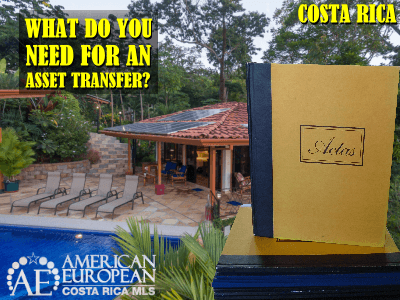I started practicing law in Costa Rica in 2003. At the time, incorporating, or not incorporating a company in Costa Rica to hold real property and other assets, was a straight forward decision.
Property buyers were Incorporating a Company for basically 3 reasons:
1. Limited liability aspect afforded by the corporate structure.
2. Anonymity afforded by not recording the shareholders in any public document, or registry,
3. The ability of the empowered members of the Board of Directors to transfer the title of an asset on the death of a shareholder. It was not required to have a Company Resolution consented to by 100% of the shareholders. This was circumventing the requirement for a Will and the Probate of the deceased shareholder’s shares.
- (Have you paid your mandatory corporation tax every year? Did you get your mandatory digital signature yet? Did you register the shareholders with the government? If your answer is NO and you don’t know how to resolve this, click on the banner below. We have the solution, at a very affordable cost.)
As a result, over the past few years, the advantages of incorporating a company to hold real estate title in a corporation have slowly been eroded for various reasons:
- Changes in the laws respecting Minority Shareholder Rights;
- Requirement for the public registration of the company shareholders;
- As well as various tax law changes.

Asset Transfer
The surviving empowered members of a company board are now required to enact a Company Resolution with 100% of the shareholders consenting to transfer an asset from the company.
This change in the law requires a Will and the Probate of a deceased shareholder’s shares, prior to such a Resolution being enacted.
Also, when selling an asset, shareholders possibly living all over the world, have to personally sign this Resolution.
Digital Signature
In September 2019, the Costa Rica Central Bank will require all Costa Rica companies to list publically their shareholders utilizing a digital signature system.
The complete disclosure of all of the final beneficiaries of the shares is mandatory.
The digital signature required for company shareholder registrations, and related corporate matters, may only be obtained and utilized by a Costa Rican Citizen, or a foreigner holding Costa Rica Residency (DIMEX)
This registration process will be instituted based on the final number of the corporate registration numbers of the company. As a result, they will start with the ending number 0 in September, and continuing through to the number 9 in the final month of the registration process.
Tax Law
With respect to the Tax Law changes:
Corporation Tax
The Corporate Tax Law – flat tax was instituted some years ago and is now approaching US $115.00 per year for inactive companies. Paying this Corporation Tax from outside Costa Rica is difficult. It usually requires the hiring of a party within Costa Rica to pay the Tax on behalf of the company.
Companies which have been struck from the National Registry for the non-payment of the Corporation Tax for a period of three years or greater may be reinstated through a notary procedure. This is somewhat expensive, in addition to paying the Corporation Tax, arrears, with accrued interest. There is also a process for transferring the assets in the struck company to the shareholder(s). This requires Notary fees to transfer the asset, along with the payment of the Property Transfer Tax, and Registry fees.
There is now also a requirement to file an annual Tax Return for non-active holding companies and active companies.

D-140 Tax Form Filing
In 2017, there was a requirement established under the Tax Law for the filing of the D-140 Tax Form with the Tax Department, for all inactive companies, setting-out current corporate and legal representative data for the particular company.
The law established significant penalties for failing to file the Form within the required time frame. These ended in October 2018. To date, it remains a mandatory requirement to file the Form. Certainly, the sanctions for failing file have yet to be enforced.
My opinion
As a result, there are, in my opinion, few advantages remaining for incorporating a company in Costa Rica. Only the limited liability aspect of incorporation is left unscathed. But, even the limited liability aspect of incorporating a company can be covered by adequate insurance coverage, in most instances.
Therefore, in my opinion, a Costa Rica company shareholder may rightfully wish to consider to dissolve their company and transfer the assets to be held personally.
This will, of course, incur the fees of a Notary Public for
- Dissolution of the Company
- Transfer of the Property Title in the National Registry,
- Payment of the Property Transfer Tax (1.5% of the property transfer value) and Registry fees (approximately 1% of the property transfer value).
Contact me at rick@costaricacanadalaw.com if you need any legal assistance when buying a property in Costa Rica.
The Author
Attorney Richard (Rick) Philps is a Canadian citizen and a naturalized citizen of Costa Rica. Rick practiced law in Victoria, B.C., Canada as a member of the Law Society of British Columbia, for fourteen years. After moving to Costa Rica in 1998, Rick earned his Bachelor of Laws and Licensing Degrees (Civil Law) with Honours, and a Post-Graduate Degree in Notary and Registry Law, from the Metropolitana Castro Carazo and Escuela Libre de Derecho Universities, in San Jose.
Rick is a member of the Costa Rica College of Lawyers. He practices law in Costa Rica in the areas of real estate and development, corporate, commercial, contract, immigration, and banking. To contact Attorney Rick Philps, please use the following information: Email: rick@costaricacanadalaw.com or visit Website.


















